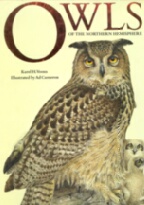Homage to Karel H. Voous (1920-2002)
Bruce G. Marcot
One of the pioneers of
owl research was Dr. Karel Hendrik Voous, a Dutch ornithologist and author of
the seminal tome "Owls of the Northern Hemisphere."
"Owls of the Northern Hemisphere."
For
a time, he and I corresponded, first about our respective owl studies, and
then soon thereafter about other dimensions of our appreciation for nature and
creatures of the night.
I learned through
our correspondence that Karel was a wonderfully gracious, open-minded, and
open-hearted individual.
At the slight
risk of betraying a confidence, I would like to recount here some of his
personal letters to me, for they speak of a love of the natural world that we
all could do well to rekindle in ourselves.
Letter dated 13 June 1997, from Prof. K.H. Voous to Dr.
Bruce Marcot:
Dear Mr. Marcot,
Unfortunately
I am late in acknowledging the receipt of copies of your paper on owls in
old forests of the world. However late, I am thanking you very much!
Your
treatise shows how much owls depend on old forests and it is a point to
wonder whether these and perhaps originally all owls developed as forest
birds.
I experience owls in dense
forests as ghosts, moving silently among the ghostly vegetation and at times
announce their presence by almost intimidating calls.
It
still has to be shown that reforestation can bring back or help declining
forest-owl populations, but let us hope it will do.
Your
paper is typographically beautifully made up and it is easy to find one's
way in it. Hence, a double congratulation is well deserved.
With
kind thanks and wishing you good luck with the study and the conservation of
forest owls and hoping to hear from you in the near future again,
Yours
sincerely,
K.H. Voos
I of course continued our wonderful correspondence, and thereafter received
this next reply, again in well-ordered, clearly legible hand script on the owl
letterhead. Here, I discovered Karel's penchant for writing poetry.
Letter dated 30 October 1997, from Prof. K.H. Voous to
Dr. Bruce Marcot:
Dear Dr. Marcot,
It
was a great pleasure for me to receive your letter of 17 October with
reminiscences of owl research. Unfortunately, owing to poor health I
am no longer in a position to study owls. But I still enjoy them and
read owl publications.
Your paper with
Jack W. Thomas on Spotted Owls is exceptional for its prose and the
introductory quotations. I like that very much.
Equally
attractive is your poem "Owls," which evokes in me the feeling of
the early-night's forest and the first shadows of owls hunting in the
moonlight.
I once ventured to write a
poem: In Remembrance of the Japanese Ornithologist Y. Yamashirna. I
am enclosing a fotocopy.
At present I
am concentrating on Anatidae and on the relationship of big predators with
man, including the cultural differences between various peoples and their
different attitudes toward dangerous animals which may turn man from hunters
to the hunted ones.
Owls remain for me
the expression of the mystery of predator life.
Once
more, kind thanks and with best regards,
Yours
sincerely,
Karel H Voous
Enclosed with this letter was indeed a photocopy of his published poem, which
I recount here in full, as published in the Journal of the Yamashina Institute
of Ornithology (vol. 21, p. 138; 1989).
=====================
In
Remembrance of the Marquess
Dr. Yoshimaro Yamashina
(1900-1989)
Karel H. Voous
The bird proclaims eternal beauty,
divine design.
Even if in reality of nature
the bird is aggresive, competitive,
as egoistic as its genes.
The bird
sings its eternal song:
for Whom?
Love and beauty everywhere:
from Whom?
No sorrow, no sin, no war?
Or . . . ?
The prime of
ornithologists
are like birds.
No scientific robots anymore.
The subject turns into the object.
The object becomes the subject once again.
In
exactly this way I will remember him,
as I have observed him and spoken to him.
The
blossom falls
when the fruit starts ripening.
Not always so.
To what end?
For what?
For whom?
For mankind, earth or heaven?
The bird
continues singing,
continues dying
on its migrations far and near.
The mysteries of daily death
and eternal live.
Easter 1989
(Professor, Free University, Amsterdam, and
Institute of Taxonomic Zoology,
Amsterdam, The Netherlands)
I now keep this treasured correspondence with Karel within the pages of his
master work, "Owls of the Northern Hemisphere." And offer this
humble web page as a tribute to the soul of a man who loved owls.
- Bruce G. Marcot, May 2006
 "Owls of the Northern Hemisphere."
"Owls of the Northern Hemisphere."